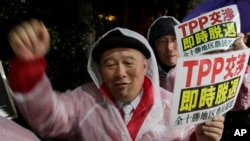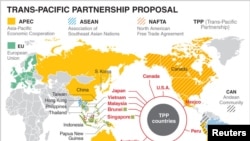Economists and trade experts say Cambodia should consider carefully whether to ever join the Trans Pacific Partnership, a large trade initiative led by the US that so far includes 12 countries.
Chan Sophal, director of the Center for Political Studies, told VOA Khmer that the partnership includes a lot of conditions imposed by developed countries, so Cambodia could have a hard time meeting them, and must weigh the costs and benefits of the deal, regardless.
“We must have a calculation, make an evaluation, and study and think comprehensively, so that we can get a significant understanding,” he said.
“Our country lags behind many countries in Asean in terms of development, and we would have difficulty in meeting different conditions,” he said. “I think that this TPP has political concepts, because it is led by the US, Japan, and other countries that have put a lot of effort in creating a region to do trade broadly, in order to counter different views that would be in favor of China.”
Ngoun Meng Tech, director-general of Cambodian Chamber of Commerce, told VOA Khmer that Cambodia is not ready for such an agreement. Cambodia must consider carefully any such deal, he said. “Although Asean stands still and always delays up to now, we have to study clearly, because we are afraid that we can’t compete with others, which would spoil our benefits.”
Prime Minister Hun Sen has questioned the motivations behind the partnership deal, whose only Asean countries are Brunei, Malaysia, Singapore and Vietnam. The partnership reduces economic barriers, determines labor and environmental standards, and protects intellectual property. Many see it as a boon for major companies and multinational corporations.
The deal could cause problems within Asean, Hun Sen warned. “This is a question that I keep asking: What is the real purpose of forming the Trans-Pacific Partnership? Why does the Trans-Pacific Partnership take only half of Asean, and keep others outside?”
Cambodian economists say it is too soon to answer that question. However, Chan Sophal said that the risks of Cambodia joining this kind of trade deal are relatively low, if it were possible, because Cambodia’s market is already open. More conservative countries, with closed markets, have other considerations, he said.
Meanwhile TPP has struggled to get approval in the US, with significant opposition in Congress, and must be ratified by the 12 nations it now includes.








